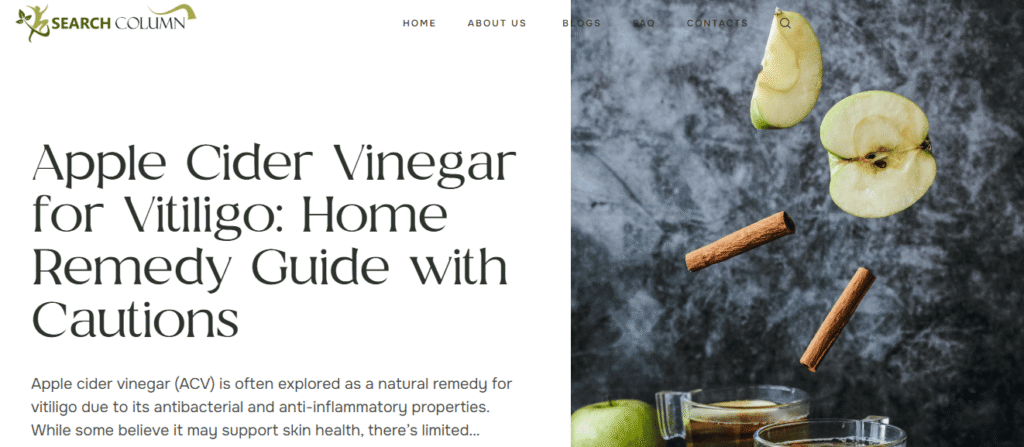Vitiligo is a complex skin condition that causes the loss of pigment in certain areas of the skin, resulting in white patches. While medical science continues to explore effective treatments, many people turn to natural remedies for support. One such remedy that has gained popularity is apple cider vinegar (ACV). Known for its numerous health benefits, ACV is being explored by some as a potential supportive solution in vitiligo care.
In this blog, we’ll explore what vitiligo is, how apple cider vinegar may help, methods of application, precautions, and how it fits into a holistic skincare routine.
Understanding Vitiligo
Vitiligo is a chronic skin condition characterized by depigmented patches caused by the destruction of melanocytes—the cells responsible for producing melanin (skin pigment). It affects people of all ages, races, and genders. While vitiligo is not contagious or life-threatening, it can significantly affect an individual’s self-esteem and emotional well-being.
The exact cause of vitiligo remains unknown, but factors such as autoimmune responses, oxidative stress, genetic predisposition, and certain environmental triggers are believed to contribute.
What is Apple Cider Vinegar?
Apple cider vinegar is a type of vinegar made from fermented apple juice. It contains acetic acid, enzymes, probiotics, and several nutrients, which contribute to its antibacterial, antifungal, and anti-inflammatory properties.
ACV has long been used in traditional medicine for:
- Improving digestion
- Regulating blood sugar levels
- Supporting weight loss
- Enhancing skin and hair health
- Acting as a natural antiseptic
Due to its natural composition, many believe it can play a role in improving skin conditions such as eczema, acne, and even vitiligo.
How Apple Cider Vinegar May Help Vitiligo
While there is no scientific proof that apple cider vinegar can cure or reverse vitiligo, some anecdotal evidence and traditional practices suggest it might provide supportive skin benefits in the following ways:
1. Balances Skin pH
Healthy skin maintains a slightly acidic pH, which acts as a barrier against harmful microbes. ACV, being acidic in nature, may help restore the skin’s natural pH, improving its defense mechanism and overall texture.
2. Reduces Oxidative Stress
Oxidative stress is believed to be a key factor in the destruction of melanocytes. Apple cider vinegar contains antioxidants, which may help neutralize free radicals and protect skin cells from damage.
3. Antibacterial & Antifungal Action
ACV’s antimicrobial properties can help prevent skin infections, which sometimes occur on depigmented or sensitive areas. Maintaining clean, healthy skin is essential for individuals with vitiligo.
4. Improves Blood Circulation (Topically)
When massaged onto the skin, apple cider vinegar may improve local blood flow. Better circulation could potentially stimulate melanocyte activity, although this claim lacks scientific validation.
5. Supports Detoxification (Internally)
Some natural health practitioners recommend drinking diluted ACV to detox the body and strengthen the immune system, which might help regulate autoimmune triggers associated with vitiligo.
How to Use Apple Cider Vinegar for Vitiligo
If you’re considering trying apple cider vinegar for vitiligo, here are some methods of application. Always consult a healthcare provider before adding any new remedy to your skincare routine.
1. Topical Application
What You Need:
- Organic, raw, unfiltered apple cider vinegar (with “the mother”)
- Filtered water
- Cotton balls or a soft cloth
Steps:
- Mix apple cider vinegar and water in a 1:1 ratio.
- Soak a cotton ball in the mixture.
- Apply gently to the affected areas of the skin.
- Leave it on for 15–20 minutes, then rinse off with lukewarm water.
- Repeat once daily.
Tips:
- You can apply moisturizer or aloe vera gel afterward to soothe the skin.
- Always do a patch test first to check for any allergic reaction or irritation.
2. Apple Cider Vinegar Bath
Instructions:
- Add 1 to 2 cups of apple cider vinegar to a warm bath.
- Soak for 20 minutes.
- Pat skin dry gently and apply a natural moisturizer.
This method may be useful for individuals with widespread vitiligo patches.
3. Internal Consumption (Optional and With Caution)
Instructions:
- Mix 1 tablespoon of apple cider vinegar in a glass of warm water.
- Drink once daily, preferably before meals.
Caution:
Never drink apple cider vinegar undiluted. Excessive use may cause throat irritation, tooth enamel erosion, or stomach upset.
Precautions When Using Apple Cider Vinegar
While apple cider vinegar is generally considered safe for most people, certain precautions are necessary:
- Avoid Undiluted ACV on Skin: It can be too harsh and may cause burns or irritation.
- Do a Patch Test: Apply a small amount on a small area of your skin before using it widely.
- Do Not Use on Broken Skin: Applying ACV to cuts or abrasions can cause stinging and pain.
- Check for Allergic Reactions: Discontinue use if you experience itching, redness, or rashes.
- Consult a Doctor: Particularly if you have sensitive skin, allergies, or are on medication.
Can Apple Cider Vinegar Cure Vitiligo?
It is important to emphasize that apple cider vinegar is not a cure for vitiligo. No clinical studies have proven its effectiveness in reversing pigmentation loss. However, it may support general skin health, reduce inflammation, and help maintain a healthier skin environment when used consistently and carefully.
Vitiligo is a medical condition that may require a combination of dermatological treatments such as:
- Phototherapy
- Topical corticosteroids or calcineurin inhibitors
- Depigmentation therapy (in extreme cases)
- Cosmetic camouflage products
Natural remedies like ACV should only be used as complementary options, not replacements for medical care.
Additional Natural Remedies Often Used With ACV
If you’re considering a natural approach, these remedies are sometimes used alongside ACV:
- Neem oil: Anti-inflammatory and may support melanin production
- Turmeric and mustard oil paste: Traditionally applied to white patches
- Ginkgo biloba supplements: May slow the progression of vitiligo
- Aloe vera gel: Hydrates and soothes the skin
- Copper-rich foods: May help support melanin formation internally
Final Thoughts
Apple cider vinegar for vitiligo is gaining attention as a natural remedy with potential skin-supportive benefits. While not a proven treatment, it may help balance skin pH, reduce inflammation, and prevent microbial infections when used topically and safely. Always consult a dermatologist or healthcare provider before starting any new remedy, especially if you are already undergoing medical treatment.
Consistency, patience, and a holistic lifestyle that includes proper skincare, stress management, a balanced diet, and professional medical support can help manage vitiligo more effectively.
- Apple Cider Vinegar for Vitiligo: A Natural Approach to Skin Health
- Discover the benefits of apple cider vinegar for vitiligo. Learn how this natural remedy may support skin health and manage white patches effectively.
- apple cider vinegar for vitiligo
Related posts:
 Smilo helps Barnsley patients enjoy long-lasting healthy smiles
Smilo helps Barnsley patients enjoy long-lasting healthy smiles
 Is Laser Liposuction Painful or Comfortable? Comprehensive Guide
Is Laser Liposuction Painful or Comfortable? Comprehensive Guide
 Is It Safe to Buy Generic Sifasi HCG Injections Online? Benefits, Risks & Smart Buying Tips
Is It Safe to Buy Generic Sifasi HCG Injections Online? Benefits, Risks & Smart Buying Tips
 The Truth Behind Organic Foods: A Healthier Path to Sustainable Living
The Truth Behind Organic Foods: A Healthier Path to Sustainable Living
 What Are the Risks and Complications Associated with All on Four Implants?
What Are the Risks and Complications Associated with All on Four Implants?
 Tips for Combining Yoga Retreats and Vacation for a Great Trip
Tips for Combining Yoga Retreats and Vacation for a Great Trip
 Holistic Sports Medicine for Injury Prevention – Online Course
Holistic Sports Medicine for Injury Prevention – Online Course
 Cheek Reduction Surgery: How Should You Prepare for Cheek Reduction Surgery?
Cheek Reduction Surgery: How Should You Prepare for Cheek Reduction Surgery?






